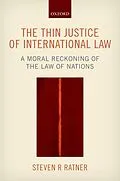In a world full of armed conflict and human misery, global justice remains one of the most compelling missions of our time. Understanding the promises and limitations of global justice demands a careful appreciation of international law, the web of binding norms and institutions that help govern the behaviour of states and other global actors. This book provides a new interdisciplinary approach to global justice, one that integrates the work and insights of international law and contemporary ethics. It asks whether the core norms of international law are just, appraising them according to a standard of global justice derived from the fundamental values of peace and the protection of human rights. Through a combination of a careful explanation of the legal norms and philosophical argument, Ratner concludes that many international law norms meet such a standard of justice, even as distinct areas of injustice remain within the law and the verdict is still out on others. Among the subjects covered in the book are the rules on the use of force, self-determination, sovereign equality, the decision making procedures of key international organizations, the territorial scope of human rights obligations (including humanitarian intervention), and key areas of international economic law. Ultimately, the book shows how an understanding of international law's moral foundations will enrich the global justice debate, while exposing the ethical consequences of different rules.
Autorentext
Steven R. Ratner is the Bruno Simma Collegiate Professor of Law at the University of Michigan Law School. His research has focused on a range of contemporary challenges facing governments and international institutions, including ethnic conflict, territorial borders, implementation of peace agreements, regulation of foreign investment and global business, the normative orders concerning armed conflict, and accountability for human rights violations. For the last ten years his research has concerned issues at the intersection of ethics and international law. Outside the academy, he was a member of the UN Secretary-General's Group of Experts on Cambodia in 1998-99 and of the UN's Panel of Experts on Accountability in Sri Lanka in 2010-11. Since 2009, he has served on the State Department's Advisory Committee on International Law.
Inhalt
- Introduction: Looking for Justice in International Law
- Part I: The Framework of Thin Justice
- 1: Legal and Ethical Approaches to Global Justice: The Dialogue of the (Near-)Deaf
- 2: Conceptual Groundwork for a Standard of Global Justice
- 3: A Standard of Global Justice
- Part II: The Justice of Core Norms on Statehood
- 4: Norms of Territorial Integrity and Political Independence: The Ban on the Use of Force and Non-Intervention
- 5: The Claims of Peoples: Self-Determination and State Borders
- 6: Norms of Participation: Sovereign Equality of States
- 7: Sovereign Equality's Limits: Membership and Decisionmaking Rules in International Organizations
- Part III: The Justice of Territorially Based Protections of Human Rights
- 8: Human Rights for Whom? Territoriality, Extraterritoriality, and Universal Jurisdiction
- 9: Extraterritorial Protection of Human Rights through Force: From Humanitarian Intervention to the Responsibility to Protect
- Part IV: The Justice of Core Norms on the Global Economy
- 10: Regulating Global Trade
- 11: The International Investment Regime
- Part V: Limitations and Aspirations
- 12: The Limits of Thin Justice: International Humanitarian, Criminal, and Environmental Law
- 13: Beyond Thin Justice
